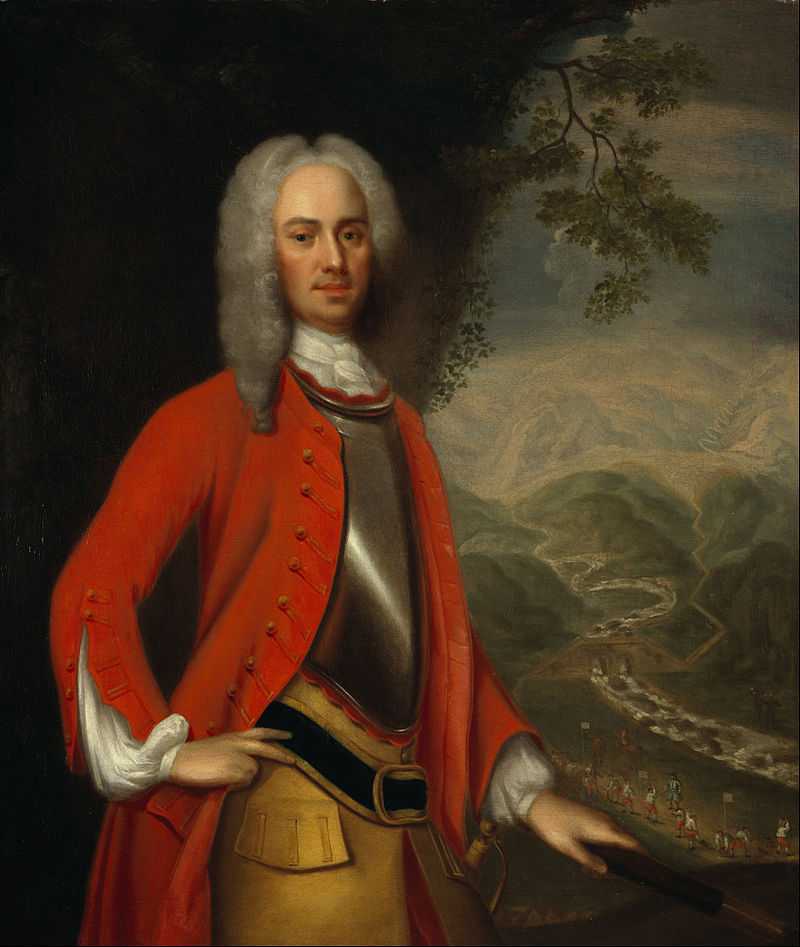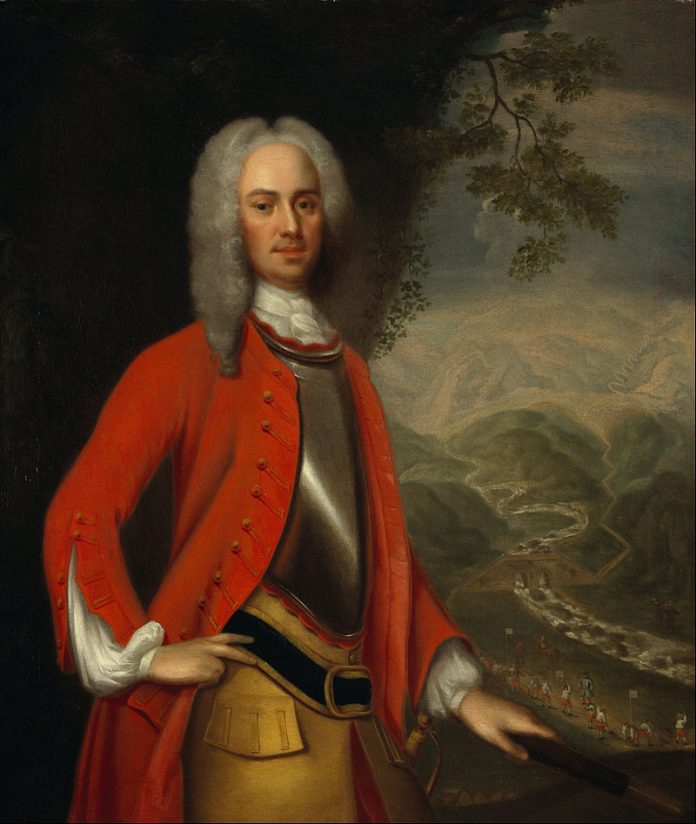
George Wade was born in 1673 in Killavalley, Westmeath, Ireland, and is best remembered as the father of the military road-building programme that he oversaw and directed during his tenure as commander-in-chief Scotland (1724-1740).
Wade was the third son of Jerome Wade, an army officer who had served in the army of the Protectorate.
Wade’s grandfather, William Wade, was an English cavalry officer who had served under Cromwell during his campaign in Ireland. For his service, William was granted lands in Westmeath.
William’s son Jerome became an officer in the army of the Protectorate and later settled in Killavalley, Westmeath. Jerome later served with the Tangier garrison where it is believed his son George spent his early years.
On 26 December 1690, George Wade was gazetted ensign in the Earl of Bath’s Regiment of Foot. The regiment was sent to fight the French in Flanders and saw action at the battle of Steinkirk in August 1692.
In 1693, he was gazetted lieutenant and in 1694 he was a captain-lieutenant before being promoted to captain in 1695 and given command of the regiment’s grenadier company. Following the Peace of Ryswick (1697), Wade returned home with his regiment.
When hostilities with France renewed in the War of the Spanish Succession, Wade’s regiment returned to Flanders in 1702. He distinguished himself at the siege of Liege where his grenadier company stormed and captured the citadel.
In March 1703 he was promoted to major and later that same year became a lieutenant-colonel.
in 1704 Wade volunteered to serve in the Earl of Galway’s expedition to Portugal and Spain where he served as a staff officer. During the campaign, he became commanding officer of Huntingdon’s Regiment following the death in battle of Colonel Robert Duncanson (of Glencoe infamy) and led them in to action at Alcantara (April 1706) and Almansa (April 1707).
Returning to England with dispatches in January 1708, Wade was promoted to brigadier-general and returned to Spain where he was appointed second-in-command to General Stanhope for his expedition to Minorca. It was there on that hilly and rocky island that Wade got his first experience of road building.
In August 1710, Wade again distinguished himself in battle at Saragossa before returning to England after the peace of 1711.
Shortly after the accession of George I to the throne of Great Britain Wade was promoted to major-general and appointed commander in Ireland although he never took up the appointment.
During the Jacobite Rising of 1715 Wade was sent with two dragoon regiments to the Jacobite hotbed of Bath where he was able to disrupt a number of Jacobite plots and uncover a large number of weapons. He also foiled a plot in 1716 by the Swedish ambassador to support the Jacobites, further enhancing his reputation as an intelligence officer.
In 1722, Wade became MP for Bath and held the seat for 25 years, during which time he did considerable charity work for the town and its people.
In 1724, Lord Lovat wrote to George I about the ongoing situation in the highlands. The king was interested and wanted the matter investigated further. Wade was chosen for this task and travelled to the highlands in the summer of 1724. In December that year, he submitted his report to the king.
He estimated that there were around 22,000 men in the highlands able to bear arms, of which 10,000 were supporters of the government and 12,000 which were ready to ‘rise in arms in favour of the Pretender’. Needless to say, this caused some alarm to the government in London who were concerned about future Jacobite threats.
Wade also stated that the 1716 Disarming Act designed to disarm the Jacobite clans following the 1715 rising had been largely ineffective. He recommended the re-establishment of the Independent Highland Companies to help police the highlands, a new Disarming Act with harsher penalties and new forts to be constructed. In concluding his report Wade said: ‘The Highlands are still more impracticable from the want of roads and bridges’.
On 24 December 1724 Wade was appointed Commander-in-Chief, Scotland, taking over from Lieutenant-General George Carpenter.
Wade did not want to subjugate the highlands for the benefit of the lowlanders or the English but rather wanted to see it policed by its own people for their own benefit and he reintroduced the formation of the Independent Highland Companies to keep watch in the more troublesome areas.
In April 1727, Wade was promoted to lieutenant-general and in 1739 was promoted to full general. The following year he left Scotland, leaving the road-building programme in the very capable hands of fellow Irishman Major William Caulfeild, Wade’s Inspector of Roads.
Wade was made a field marshal on 17 December 1743 and was appointed to the joint command of the British and Allied army in Flanders to fight against the French in the War of the Austrian Succession. Wade organised an advance towards Lille in July 1744, but the action became stalled in the face of logistical problems. He resigned from his command in March 1745 and returned home to become Commander-in-Chief of the Forces.
In October 1745, during the Jacobite rising, Wade concentrated his troops in Newcastle upon Tyne, on the east coast of England; however, the Jacobite forces advanced from Scotland down the west coast of England via Carlisle into Lancashire and the speed of their advance left Wade scrambling. In freezing conditions and with his men starving, he failed to counter their march into England or their subsequent retreat back from Derby to Scotland. Wade was replaced as Commander-in-Chief by Prince William, Duke of Cumberland, who led the army to success at the Battle of Culloden in April 1746.
Because of the difficulties Wade encountered marching his troops cross-country from Newcastle to Carlisle that he built his Military Road west of Newcastle in 1746, entailing such destruction of Hadrian’s Wall. Wade helped plan the road but died before construction began in 1751. His Military Road is still in use today as the B6318.
Wade received mention in an unofficial verse sung as part of God Save the King:
Lord, grant that Marshal Wade
May, by thy mighty aid,
Victory bring.
May he sedition hush
And, like a torrent, rush
Rebellious Scots to crush.
God save the King.
Wade died unmarried on 14 March 1748 and was buried at Westminster Abbey.

